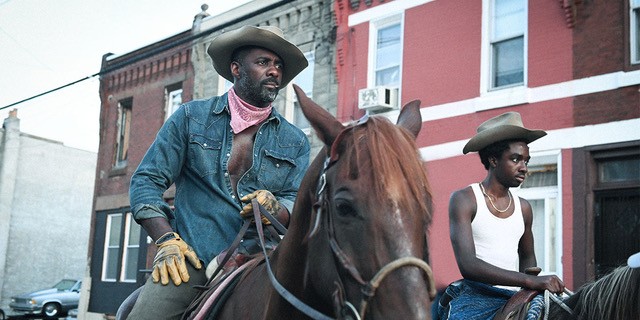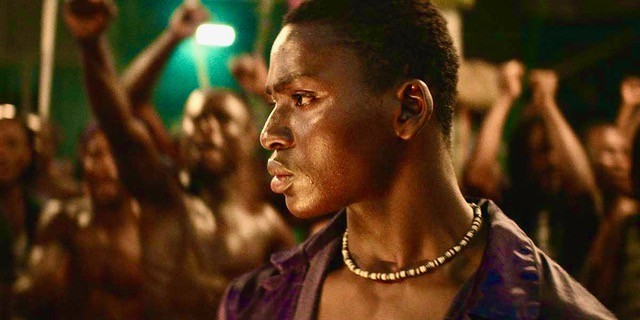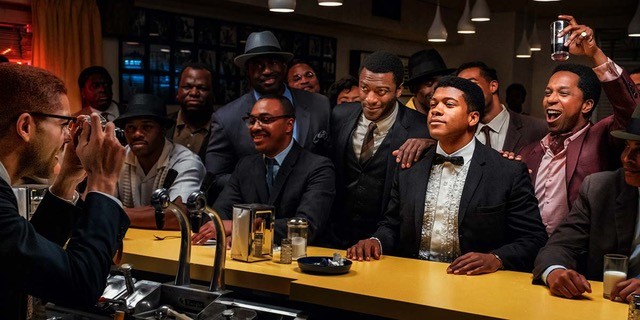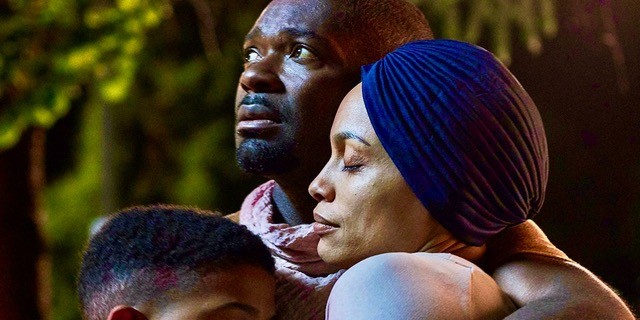By Dwight Brown
NNPA Film Critic
TIFF has always been a haven for black films and artists. And now, in this year of BLM, it has stepped up its game showing a particular reverence for African diaspora films. In 2020, film festivals are finding creative ways to present movies to a vast audience as safely as possible. TIFF took a holistic approach. It featured digital screenings, live virtual events, limited capacity theater screenings and drive-in showings.
Check out these noteworthy films that will premiere in your local theaters, on VOD or streaming services in the coming months leading up to the awards season.
40 Years A Prisoner (**1/2) In 1978, MOVE, a group of black revolutionary activists, braced for a confrontation with the police in their commune in a Philadelphia rowhouse. Law enforcement was on their doorstep, breaking in. A baby was killed and an officer died. Nine members of the commune, who embraced black power, veganism and an anarcho-primitivism philosophy, were sentenced to 30-40 years in prison. Debbie and Mike Africa were among the convicted, and she gave birth to a child while incarcerated. Forty years later, their son Mike’s fight to get his family paroled is the subject of filmmaker Tommy Oliver’s documentary.

Days leading up to the violent incident, the event and its aftermath are recollected by journalists, neighbors, cult members, ex-policemen and politicians who recall the explosive rhetoric and formidable hostilities on both sides. Also, on view is the notoriously aggressive Philly police force and a fiery Mayor Frank Rizzo. But somehow, finding out what really made MOVE members tick is never really clear. Mike wants his parents freed: “I’m committed to them the way they were committed to me.” Audiences might feel that way too if the doc had dug deeper into MOVE’s origins. Viewers never find out what the group ever accomplished. To many they were an enigma before screening the film and will remain one after.

Akilla’s Escape (**) A drug deal goes awry. A seasoned 40-year-old dealer, Akilla Brown (Saul Williams), captures one of the interloping thieves, a teenage Jamaican boy named Sheppard (Thamela Mpumlwana). The teen reminds him of his younger self, when he was a wannabe gangsta in a group called the Garrison Army. With a script by Charles Officer and Wendy Motion Brathwaite and under the direction of Officer, the overly rich plotline becomes a bit fuzzy as it drifts between Toronto and Brooklyn and the ‘90s and 2020 with little dexterity. A very loud soundtrack (Robert Del Naja and Saul Williams) pumps up the emotions but can’t make up for a story that’s way too jumbled, even with its cautionary crime doesn’t pay theme. Having Mpumlwana play both Sheppard and the younger Akilla adds to the confusion. Clichéd dialogue often runs in platitudes. The action scenes are never up to the standards of a good crime/action/thriller. Tighter editing and a more fine-tuned script would have helped. Listening to the Jamaican patois is a pleasure.
NDG 9/10: Representative Carl O. Sherman Sr. introduced Bo’s Law Sunday

Concrete Cowboy (***1/2) This very endearing father/son drama is as emotionally powerful as The Great Santini and as respectful to Black cowboy culture as Miss Juneteenth. A worried mother (Elizabeth Priestley) forces her troubled teen son (Caleb McLaughlin) to live with his estranged dad (Idris Elba) for a summer in Philly. Their bonding is rocky. Domineering dad. Son who hangs with a juvenile delinquent (Jharrel Jerome, Moonlight). Tough love? Son: “I ain’t staying here.” Dad: “Once you step out, that door stays locked until morning!” Evocative images? A horse lives in the dining room of their rowhouse.
The script (Dan Walser and Ricky Staub) examines the inequity of gentrification, the failures of local politicians and need for home ownership in the black community. The story is based on the novel Ghetto Cowboy by Greg Neri and takes its cues from the true-life Fletcher Street Stables. It’s a 100-year-old horsemanship community in North Philadelphia that has been a refuge to troubled youth. First-time feature film director Ricky Staub sets a wondrous and dramatic tone that never wanes. The entire ensemble cast (including Byron Bowers, Lorraine Toussaint and Cliff “Method Man” Smith) shines. British actor Idris Elba morphs into another iconic American characters with an ease and urban drawl that makes the dad figure prominent, in an Oscar-worthy way. Visons of black cowboys galloping on horseback in The City of Brotherly Love are indelible.
NDG 9/10: The Fear Factor: Protest against injustice, but vote against policies
Good Joe Bell (***1/2) Most of Mark Wahlberg’s performances are tied to ultra-masculine roles (pugilist in The Fighter; bounty hunter in Transformers: Age of Extinction). In this touching and sobering family drama, his interpretation of an Oregon father in search of redemption lets him give his most layered, nuanced and sensitive performance yet. In an effort to alert the world to the perils of bullying, Joe Bell (Wahlberg) sets out on a cross-country trek to bring his consciousness-raising speeches to schools, community centers—anyone who will listen. He is supported on his journey by his wife (Connie Britton, TVs Nashville) and his vulnerable teenage son (Reid Miller, TV’s Play by Play).
Screenwriters Larry McMurtry and Diana Ossana, (Brokeback Mountain) based their poignant script on real characters. With director Reinaldo Marcus Green (Monsters and Men) guiding the production and cinematographer Jacques Jouffret behind the camera, the footage, from highway stretches to football games and local diners looks well composed and staged. Green gets superb performances from the entire cast—especially Wahlberg who should win an Oscar nom. The film has an emotional core that hooks you from the first frame until the final epilogue describing the burdens of the real Joe Bell. Excellent and heartfelt.
NDG 7/30: More Than A Vote: How LeBron James is leveraging star power to empower voters
Memory House (**1/2) Colonialism is over in Brazil, but its remnants are not. An Indigenous–Afro Brazilian man from the rural north, Cristovam (Antônio Pitanga), has spent decades employed at a milk factory in the south. As the owners try to save money, he’s victimized by his job and is the subject of ridicule and physical abuse in the vastly white Austrian heritage community where he lives.
First-time writer/director João Paulo Miranda Maria examines ingrained racism in this modern allegory. As played by 81-year-old actor Antônio Pitanga, the lead character exhibits a natural vulnerability initially that inspires empathy for him and hate for his tormentors. However, the film’s mixture of mystical elements (visions, chants and animals) and harsh reality, though ambitious, don’t gel well. Also, watching the elderly man be tormented for 93 minutes, without a real payoff, will test the audience’s patience.
Cinematographer Benjamín Echazarreta (A Fantastic Woman) shoots footage that’s mesmerizing, especially in an opening sequence with Cristovam in a silver hazmat suit looking like an astronaut. In addition, there is something so spiritual and profound about Pitanga’s performance.

Night of the Kings (***/12) La Maca is a notorious, large-scale Côte d’Ivoire prison that is ruled by its inmates. Prisoners are led by Barbe Noire aka Blackbeard (Steve Tientcheu, Les Misérables), a king who is under siege by factions readying a coup. When a young man (Koné Bakary) is imprisoned, he’s scared to death. Slyly Barbe Noire deflects attention to a mystical red moon in the night sky and anoints the new inmate as a griot who sees the future and past. To survive the kid must convincingly weave personal anecdotes and historic events into a story that will charm the mob.
With this venture, Ivory Coast writer/director Philippe Lacôte firmly establishes his place among the greatest African filmmakers: Souleymane Cissé (Yeelen), Ousmane Sembene (Guelwaar) and Abderrahmane Sissako (Timbuktu). He creates a unique story, assembles a brillant cast, sets them in an ominous penitentiary and lets them fend for themselves. Barbe Noire: “If I lose my protection I go from a hyena to a lamb.” The red moon aspects add a supernatural effect. Elements of dance, acrobatics, art and theater interact perfectly with a plot that’s as rich as any Shakespeare has conjured. Perfectly shot, edited and scored. You’ve never seen a prison movie like this.

One Night in Miami (***1/2) Kemp Powers’ provocative play One Night in Miami fictionalized a real night on February 25th in1964 when boxer Cassius Clay, football legend Jim Brown, activist Malcom X and soul singer Sam Cooke met at the Hampton House Motel in Liberty City. Actress Regina King, in her feature film directing debut with Powers as her screenwriter, makes the play cinematic.
Clay (Eli Goree, Race) has just whooped Heavyweight Champion Sonny Liston in Miami Beach. But due to segregation laws, he can’t stay on the beach and gravitates to the black side of Miami Dade County. As he, Brown, Malcolm and Cook talk, their discussions turn to social, political, racial, sports and artistic issues. Says Malcolm (Kingsley Ben-Adir, Trespass Against Us) about the empowerment of black people: “What’s good news for the sheep might be bad news for the wolf.” When Clay, who will change his name to Muhammad Ali, announces he’s going to be a Muslim, Cooke (Leslie Odom Jr., Hamilton) asks Brown (Aldis Hodge, Clemency) if he will convert too. Brown: “S—t! Have you tasted my grandma’s pork chops?!”
The words and performances are so enlightening your eyes will stay glued to the screen. As a director, King makes a lot of right choices. The ensemble acting is commendable—with a special nod to Odom Jr. for using his silky voice to sing Sam Cooke songs. The Clay/Liston boxing match is neatly shot (cinematographer Tami Reiker, Carnivàl) and the time period, locations and places are perfectly rendered all under the warm blanket of a hypnotic score (Terence Blanchard, Harriet). There are a few times when scenes stagnate in a motel room so what should remain movielike feels too much like a play. Otherwise, King has been handed a gift by playwright Kemp Powers and she has turned it into a treasure.

The Water Man (**) Actor David Oyelowo (Selma) makes an odd choice for his directing debut. It’s a script (Emily A. Needell) that centers around a family in which the mom (Rosario Dawson) is terminally ill and the father (Oyelowo) and son (Lonni Chavis, TV’s This Is Us) don’t get along. And so the boy sets out on a journey to find the Water Man, a forest creature with magical powers, in hopes that the monster can heal his mom. It’s a far-fetched fantasy kids’ drama, told from a young boy’s point of view. Though Oyelowo’s direction is decent, the story never takes you to that special place and the son’s venture into the forest rarely feels adventurous. Sightings of Bigfoot are too brief. Special effects are limp at best. The cast is earnest and the tech elements (musical score, cinematography editing) are solid enough to make the movie coherent, but not much more. The only line of dialogue that stands out is dad’s admission: “I would take a short life with your mother rather than a long one without her.”
The Way I See It (***1/2) Chief Official White House Photographer Pete Souza’s photos show that there are clear differences between the Obama administration and the Trump government. His evocative photos tell the story in this illuminating documentary by Dawn Porter (John Lewis: Good Trouble). From his close proximity to President Obama, he witnessed a lot: “I know what happened in the room. (that’s why) I’m so afraid of what’s going on in the Oval Office (now).” Souza, a historian with a camera captures fleeting moments both big and small. Intimate family time, historic achievements (reactions to Bin Laden’s killing) and even Obama blocking a shot from a pro basketball player. Prepared to be moved and awed in ways you wouldn’t expect. It’s a trip down memory lane that should excite citizens about the possibilities for tomorrow. Aloe Blacc sings the soundtrack song The Future: “…won’t let my passion die…the future belongs to me.” A surprisingly galvanizing documentary.
For more information about the Toronto International Film Festival go to https://tiff.net/. Visit NNPA News Wire Film Critic Dwight Brown at DwightBrownInk.com and BlackPressUSA.com.





[…] Credit: Source link […]